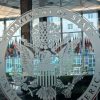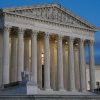Dear Patriots,
Every once in a while, it is beneficial to ignore the reams of hot headlines, quick takes and barrage of social media messages to think about the world in a deeper way.
This article by John Wilsey, published in Law & Liberty in September 2022, is a long, thoughtful history of the ever evolving place of Christianity in American life. From the beginning, with the Puritans, all the way forward to this very moment, Christian nationalism has been at the core of America.
It is worthwhile to remember our history as it will always serve as a guide to the future, if we let it.
We have excerpted a few quotes from the piece but we suggest you go to the link and read it in full.
As always, we offer information to you that we hope you will find thought provoking and useful, whether or not we, or you, agree with every word written.
The Many Faces of Christian Nationalism
Written by John D. Wilsey, Associate Professor of Church History and Philosophy at The Southern Baptist Theological Seminary and Research Fellow at the Center for Religion, Culture, and Democracy.
He is the author, most recently, of God’s Cold Warrior: The Life and Faith of John Foster Dulles (Eerdmans, 2021).
QUOTE: Just over a year ago, in the wake of the 2020 election and January 6 riots, something called “Christian nationalism” hit American mainstream culture. Numerous books have appeared that explore the phenomenon historically and sociologically. They tell us how Christian nationalism is racist, sexist, homophobic, right-wing, and even a heresy departing from the Christian faith. Our national conversation about this thing called Christian nationalism became mainstream as a response to the so-called Age of Trump.
But nationalism—especially religious nationalism—is nothing new, nor is it best understood in monolithic, simple terms. It is multifaceted, emerges from diverse ideologies, and changes as time and circumstance progress. It is manifested in both political and religio-philosophical terms. Since the colonial founding, Americans have participated in creating complex and contested nationalities. They have been divided in their visions for the nation, represented at times by loyalists against patriots, Hamiltonians against Jeffersonians, Unionists against Confederates, and segregationists against integrationists. Still today, we find competing nationalisms on left and right. Why should we be surprised? This process of national identity-creation is ongoing.
QUOTE: Woodrow Wilson, the twenty-eighth President, led the American war effort in World War I beginning in 1917. He believed God had commissioned America to lead the world into Christian civilization through the defeat of the Central Powers and the establishment of the League of Nations. Historian Milan Babík connected Wilson’s vision to Puritan millennialism: “the old Puritan dream of returning to the old world from the transatlantic refuge in order to spread the American millennium worldwide seemed to him on the verge of fulfillment.”
Wilson’s dream of an international order of Christian civilization, led by the United States, animated American interventionist foreign policy during the course of the twentieth century. John Foster Dulles, Secretary of State under Eisenhower, said in 1955, “Our people have always been endowed with a sense of mission in the world. They have believed that it was their duty to help men everywhere to get the opportunity to be and to do what God designed.” That sense of divine mission and of solemn duty undergirded American actions, especially in the early years of the Cold War.
QUOTE: America was founded upon transcendent ideas, as in the Declaration of Independence: “all men are created equal” and “they are endowed by their Creator with certain unalienable rights, that among these are life, liberty, and the pursuit of happiness.” During the Civil War, it was re-founded upon other transcendent propositions, such as Lincoln’s words in his Second Inaugural Address:
“with malice toward none, with charity for all with firmness in the right as God gives us to see the right let us strive on to . . . do all which may achieve and cherish a just and lasting peace among ourselves and with all nations.”
Since America is a nation predicated on ideas that are essential, above and beyond space and time, apply morally and ontologically to all generations, religion plays a unique role in American national identity. Without religion, the ideas that are necessary to the American project are meaningless. Thus, an American nationalism devoid of religion or religious presuppositions is inconceivable.
QUOTE: All Americans are nationalists, of some sort. As long as we abide by the laws, acknowledge the supremacy of the Constitution, enjoy the blessings that America gives, appeal to American ideals, and contend for justice in the name of the United States both domestically and internationally, we subscribe to American nationalism. To do away with religion or nationalism is to do away with America.
QUOTE: We must take the many nuances inherent in American identity seriously. The term “Christian nationalism” can serve as a useful category. Christian nationalism, to be sure, has often been articulated in ways that pervert Christianity’s message. But we should work to understand it, and when we condemn it, we should do it in precise terms. Racism is a corruption of American ideals, not a basic essential element of American identity. Religious bigotry contradicts the constitutional guarantee of disestablishment and freedom of conscience, and freedom of conscience cannot be appealed to in the name of bigotry.
Christ’s kingdom is not of this world, but we do live in the world. We Christians do not contradict ourselves when we express ordered love for Christ’s kingdom first, and our nation subsequently. We must recognize that we all inherit something from nationalism, whether political or religious. Most importantly, we cannot allow critics of Christian nationalism to use the concept as a way to further undermine the necessary place of religion and religious people in the public square.
Religion must always have a place in the public square, and patriotism as devotion to the national idea is a good thing, provided it is rightly ordered and conceived. Historical and philosophical precision are needed to pinpoint whatever kind of religio-philosophical nationalism is at hand, so that we may intelligently separate the precious from the worthless.
Pray. Know. Share.
Hold Fast,
Defending The Republic






